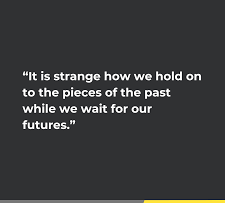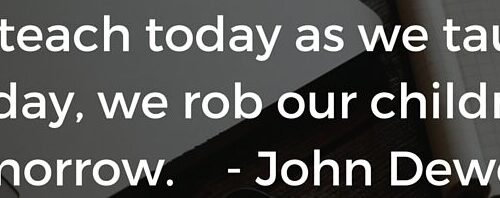If there was any debate topic I truly struggled to take a firm stance on, it was this one. As a high school teacher, I have learned to adapt to the skill sets my students bring into the classroom. I am not a math teacher, so I can’t speak directly to the importance of memorizing multiplication tables, but I can speak to the shift I have seen in how students approach their work.

When I taught at a school where every student had a device, pen and paper tasks were rare. Any time I handed out a worksheet, or asked them to take notes or complete an assignment, I would hear things like ““Can I do it on my Chromebook?” or “Can I type it?
This year was different. My students did not have consistent access to devices, so there was a lot more pen to paper work and surprisingly, there was very little resistance. They just did it. Was their handwriting always easy to read? No. If this was the case, I would have them do it again. Even assessments. In previous years, I used Google Forms or Moodle, however this year, everything was on paper. And that brings me to a bigger question: Can we create classrooms that still incorporate traditional skills, not necessarily rote memorization, but foundational skills like handwriting or spelling, without relying entirely on technology?
The Debate
Both teams did a great job of presenting solid points on this topic!
Progressive
Rose and Brianne brought up the idea of nostalgia, which really made me reflect on why we continue to have students do  spelling tests, memorize multiplication tables, and practice handwriting. Just because I did these things as a student, does that mean this generation should too? They argued that education must shift from rote memorization to fostering innovation. To further strengthen their stance, they stated that we have to prepare our students for the rapidly changing world and skills like cursive writing are obsolete, time-consuming to teach and harder to read.
spelling tests, memorize multiplication tables, and practice handwriting. Just because I did these things as a student, does that mean this generation should too? They argued that education must shift from rote memorization to fostering innovation. To further strengthen their stance, they stated that we have to prepare our students for the rapidly changing world and skills like cursive writing are obsolete, time-consuming to teach and harder to read.
This reminded me of what Mike shared, that his sons can’t read their grandma’s handwriting, but they can code. It got me thinking: what skills are truly essential after high school? Should we be prioritizing digital literacy and the technical competencies students need to thrive in a tech-driven world? Or should we be focusing more on the soft skills that are equally critical for success?
According to the following article, young people need attributes like adaptability, initiative, curiosity, and imagination—skills that are fundamental in today’s workplace. So maybe it’s not just about the hard skills, but also the human ones.
At the same time, Carol and Jillian offered an important counterpoint. They highlighted real-life situations where being able to read or write by hand was still essential, like signing legal documents or reading handwritten notes. Their perspective reminds me that this isn’t a simple either/or conversation.
Traditional
On the other hand, Vanessa and Jenna made compelling points about why traditional skills still matter. They linked handwriting to early literacy development, noting that writing by hand helps strengthen foundational reading and writing skills. They also emphasized that knowing multiplication tables is essential for understanding more complex math later on, and that spelling remains a key part of strong communication.
I appreciated how they didn’t argue against technology, but instead stressed the importance of maintaining certain foundational skills alongside digital ones. It was interesting to learn that handwriting has been shown to improve cognitive connections in learning. They posed thought-provoking questions: Is spellcheck enough? Should students rely entirely on tools that do the work for them? Are kids missing out when we replace handwriting with tapping, swiping, and screens? What about the lack of development of fine motor skills or brain development, when students don’t use a pen or pencil?
My Children’s Take
All three of my children have graduated from high school, and two of them  have completed business degrees. Their handwriting skills? Subpar. When my older son went to sign his driver’s licenses, I was mortified! After seeing my older boys’ signature, I actually made my youngest son practice he signed his.
have completed business degrees. Their handwriting skills? Subpar. When my older son went to sign his driver’s licenses, I was mortified! After seeing my older boys’ signature, I actually made my youngest son practice he signed his.
To get their take on this debate, I asked if they wished their teachers had spent more time developing their handwriting skills. My one son said, “Nope. It’s a waste of time, especially in today’s world.” My daughter had a slightly different view. “Maybe a little,” she said. “If they want to take notes by hand, sure. But most of us type them anyway.” She’s currently in law school, so I asked if handwriting plays a role there. Her answer? “Not really.” However, I asked them about the importance of spelling and even spelling tests and both of them said “Yes, definitely”. I replied but there is spellcheck and my son replied, “You still need to be able to type it so spellcheck recognizes it.”
A Colleague’s Take
To get a perspective on multiplication tables, I asked a friend of mine who is a high school math teacher and his response was “Absolutely, yes!” That is one thing he believes kids should have to memorize. He explained that it becomes challenging to teach more complex concepts, when students don’t understand how to do basic multiplication.
My Experience

This past year, I taught Financial Literacy 10, a new course mandated by the Government of Saskatchewan as a graduation requirement. During the course, there were many topics I questioned if I should cover.
For example, do kids need to know how to write a cheque or balance a cheque book? The answer is no. But what they do need to know is how to manage a bank account online or how to track their spending and how to create a budget. Furthermore, teaching them how to protect their personal information, and how to avoid scams was essential in this day and age. Even when we covered job applications, I initially considered printing out paper forms for students but everything was online, so need to!
In my Foods 10 and 20 classes this past year, I reflected on whether I spend the time teaching my students how to manually double or half a recipe when they could click a button on their phone and it would be done for them? Or should I teach them both ways?
My Conclusion
I am really torn on this topic. Yes, technology can replace many skills from the past and I believe technology enhances learning, but does that mean we just forget about the foundational skills that are or could be the building blocks of higher learning? What about the generational divide? Bridge the gap between generations? I believe that there is still a place for traditional skills in education. But I also acknowledge that I am not in the place to say that teachers need to teach traditional skills, while trying to teach digital literacy skills, get through curriculum, manage technology and manage a classroom- because that is not my reality. I am still trying to learn more about this topic.
To conclude, I want to highlight two different perspectives that support both sides of the debate. Mirra Komarovsky warns that “The greatest danger of traditional education is that learning may remain purely verbal,” cautioning against an over-reliance on rote instruction where students passively absorb information. This kind of surface-level learning risks disconnecting students from real experiences, creativity, and critical thinking.
Conversely, Doug Lemow reminds us that “Basic skills are the foundation of future learning. Without them, students will struggle to build new knowledge,” underscoring the importance of a solid foundation in order to support deeper thinking and complex learning.
My conclusion is that it doesn’t have to be one or the other. As George Couros states, “Technology can amplify great teaching, but it will never replace it. Foundational skills and human connection are still the heart of learning.” Like so many of the other topics in this course, I believe the answer lies in a balanced approach, one that values and integrates both foundational skills and emerging digital competencies. It is about finding that middle ground, embracing innovation while staying grounded in the core principles that define effective teaching and who each of us are as educators.

5 Comments
Sheila Farnell-Luff
Hi Leanne,
Thank for your thoughtful breakdown of the debate. I too struggle with this topic, and was eager to see hear both sides.
As a middle years teacher, I can attest for the importance of the multiplication table. I spend a lot of time explaining multiplication principles to my kids. This not only hampers their understanding of the topic, but it takes valuable time away from covering the curriculum. From fractions to percentages to division, understanding multiplication is essential.
One thing I won’t waiver on is my support for handwriting notes. Taking notes, in general, is a skill that needs to be taught. A few years ago, I began teaching my math students how to write out notes that were useful to study from. I reinforce their importance by asking them to refer to these notes when they ask questions, and show them how to apply the information from there to the math problem they are working on. While I questioned if this was effective, I was reassured by a parent (who is a high school math teacher) that this was indeed helpful and appreciated. I think that eliminating technology until the skill is built is more productive, because you are more likely to learn how to summarize because you can’t write word for word, unlike you can while typing (as was pointed out in class).
Thank you again for your reflection!
Rose
Hello Leanne,
I love that you took this one to ‘the streets’ to attain real-world opinions! I agree with a lot of your summations with this debate. I too was on the fence for this one and wished the three items were not clumped together for this debate.
Personally, I feel that cursive can go bye-bye anytime soon and I could care less; HOWEVER, I do believe handwritten assignments are important to practice and hone as a skill. Not cursive, but simple printing for both speed and legibility. I think it is fascinating that students have been so adamant against writing their thoughts on paper and instead self-advocate for texting/typing. As an elementary educator, I have not yet witnessed that in any of my classrooms and, I have to say, I would be shocked!
Multiplication tables are an entirely different story, I do think they are sooo imporant to learn and work on. Multiplication drills, well, that goes back to the concepts of rote learning and how drills are entirely useless when it comes to skill development and retention. As you and your math teacher friend indicated, learning your multiplication facts will help give a necessary foundation to upper-level mathematics as well as increase basic number sense. I would never stop teaching those because, based on my own experiences with kids that do not know them, it is much more time consuming to do lengthier math processes with a multiplication table and, even worse, if they choose the incorrect table answer, they do not even know that the rest of the problem is going to be wrong too.
I love that, ultimately, you decided to continue to sit on the fence for this one, that was a refreshing change from the rest of the debates this entire class!
Daegan
Hi Leanne!
I love how you tied personal connections to the content. This topic is very opinion-based since there have not been many studies done on whether replacing older skills with technology will benefit students in the long run. The voices you were able to include shed light on how using technology in place of some everyday skills is a personal preference, but those basic skills should still be taught in case they are needed. It makes me think back to when I was in high school and our math teacher used to teach us how to do most operations and equations by hand to make sure we understood the concepts. After an understanding was reached, she would show us how to use a calculator to solve the same problem for efficiency. The same idea could be applied to handwriting, spelling, and multiplication. Technology may be more efficient, but an understanding of those concepts is needed first to use technology to its full benefit. As a high school teacher, do you find yourself gravitating more towards technology? Or do you prefer to have your students complete most of their work without it?
Teagan Schiltz
Hey Leanne!
I think a lot of educators get stuck in that mindset of ‘I did it, so why shouldn’t they?’ when it comes to these seemingly traditional skills or forms of instruction. Educators need to interrogate this passive belief and acknowledge that education is evolving…our teaching practice must too.
I, too, felt torn on this one. This is something I consider often in my own work as I administer weekly spelling tests and encourage multiplication fact memorization. The research displays these skills positively impacting a student’s literacy and numeracy abilities and I find that hard to ignore. That being said, the WAY we teach spelling, writing, Math facts, etc. needs to evolve to match best practice (not simply memorization or never ending worksheets). Instilling these skills now, helps kids grow confidence and have a foundation before they start using tech for, well, almost anything.
You mention the generational gap – interesting. If we completely eliminate these traditional skills, we are definitely widening that gap. I thought Mike’s grandma birthday card example was important – we should be ensuring students can communicate with everyone right? Alternately, I understand your struggle with balancing digital skills as well. Your examples from financial literacy and foods classes demonstrate that kids don’t need the same skills they once did…and I think that’s ok.
As you say, it’s all about balance. Every topic seems to end in a statement about balance…lots to think about. Thanks!
Teagan
Vanessa Nordmark-Beahm
Hey Leanne, I love your interview approach to this topic in getting opinions from your kids and people you know. I think getting perspectives from students that are younger than us – like you kids who are working on or have recently finished degrees is a great way to get a clear picture on what seems to be worth taking the time to teach. Recently my kids (11 years old and 9 years old) asked me how I type so fast and when are they going to learn to type like that. They even asked if I could get them a program so they could practice at home. Now I am curious if they will even take a “keyboarding” class like I remember taking in school. When I taught middle years at an independent school about 5 years ago, I had my students work on a typing program, but I wonder if this skill will be one that goes the way of cursive now that we have speech-to-text and similar technologies. I don’t know. Who knows where we will be in another 5-10 years.
I love the quote “young people need attributes like adaptability, initiative, curiosity, and imagination—skills that are fundamental in today’s workplace. So maybe it’s not just about the hard skills, but also the human ones.”
Now if we can just find the right balance of teaching those skills and all the other stuff as well. lol
Thank you for your post, I hope you have a great summer!